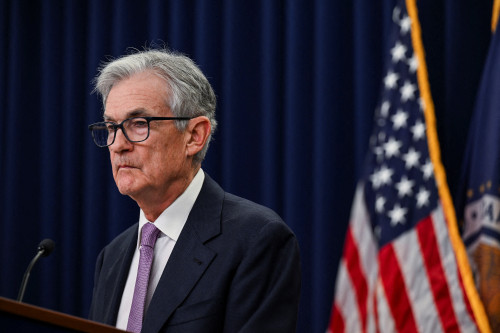By Michael S. Derby
NEW YORK (Reuters) -Federal Reserve Chair Jerome Powell said Tuesday the U.S. central bank has no plans to change how it offers dollar liquidity to other official entities.
Speaking on the matter of the Fed’s dollar swap lines system, Powell told a gathering held by the European Central Bank that “we still have the same authorities, and we’re still prepared to use them in situations where it’s within our legal authorities and where we think it makes sense.”
He added the dollar swap lines have made “a big contribution” to global financial stability.
Fed dollar swap lines offer collateralized loans to eligible central banks to ensure dollar liquidity is not an issue for the global financial system.
The current system, initiated during the global financial crisis, has been heavily used in times of crisis.
Fed swap lines now in place can lend dollar and foreign currencies, although it is the dollar-related facility that has been where the action has been. The swap line usage level can often be viewed as a proxy for international financial stress.
There has been some concern that the Fed’s currency swap lines could be shuttered amid the Trump administration’s retreat from multilateral international coordination and its broader skepticism over Fed actions, although so far, no action by elected officials has happened.
The system may also face longer run challenges as the trade policy pursued by the president may threaten the status of the dollar as a global reserve currency, which could make American money less needed by other nations, in turn reducing the need to borrow dollars in times of stress.
Speaking at the same central bank event, Bank of Korea Governor Rhee Chang-yong noted that while the dollar swap lines had helped in times of trouble there were times when there could be local dollar liquidity issues the U.S. central bank could not address.
“Our understanding is that Fed cannot extend the swap lines in that case, and we have to self defense ourselves. That is why I think they’re having an adequate, sufficient level of reserves is very important.”
(Reporting by Michael S. Derby; Editing by Alison Williams)





